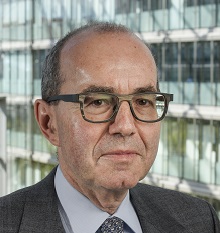Costs of cancer drugs have risen significantly in Switzerland over the past ten years, from an estimated CHF 445 million to CHF 775 million at ex-factory prices. Bearing in mind future combination treatments in immune-oncology, treatments which are likely to bring from now on unhoped for outcomes, it is timely to reflect on new kinds of pricing models. An option put up for discussion by industry is payment not just per treatment but also conditional on achieving successful outcomes. Or, in the case of combination treatments where a combination of two or even three different medicines is given to patients, the relative added value of each of these medicines in prolonging life could be examined when assessing the cost of the combination treatment. Critical questioning of rising costs in healthcare, including medicines, is legitimate. That’s why I personally don’t fudge the debate but like to respond to critics.
However, in public debates I continue to be amazed by the very biased focus on pharmaceutical pricing, as I most recently experienced in an interview with a journalist on a popular consumerist program followed by a talk show, The Club, on Swiss German TV. There is a reason why costs for cancer drugs have risen faster than costs of drugs in general. It simply relates to the huge therapeutic progress made in recent years. Thanks to new cancer drugs, some cancers can be cured, overall survival rates and quality of life have significantly improved. Take as an example breast cancer; where for patients with HER2-positive cancer, the benefit of Herceptin is enormous with eight out of ten women alive ten years after diagnosis, allowing them to pursue their profession, and support their family. Or, in the case of chronic myeloid leukemia, CML, where thanks to Glivec, the 5-year survival rate has risen from 30 to over 90 percent. Overall, today two out of three people diagnosed with cancer have survival rates of more than five years. The benefits these new treatments bring are gratifying, even if they come at a cost.
I strongly refute the argument brought forward by the TV journalists that, in the future, as a result of rising costs, only rich people will have access to cancer drugs. This runs counter to some simple facts. At present, only one cent of each Swiss franc spent on healthcare is spent for cancer drugs. It is beyond belief that anyone can argue that this one cent per franc will bust the system, even taking into account that the share of cancer drugs of total drug spending has risen over the past ten years from 10 to 14 per cent of drug spending.
To be honest, sometimes I feel like Don Quixote fighting with windmills or Sisyphus pushing a rock up the mountain only to see it roll down again in arguing with facts and figures against bias in the media or in the political debate. In both cases there has been disproportionate focus on this one per cent spent on cancer drugs, notwithstanding the significant health benefit, the better outcomes, higher survival rates, and improved quality of life such drugs bring to patients. This is in stark contrast to the other 90 per cent of health spending on hospitals or doctors, non-drug interventions, which hardly get any attention. The single-minded focus on drug spending is all the more surprising as the share of drug costs in the entire health expenditure is steadily declining. Occasionally, I am reminded here by the quote of the famous Austrian playwright Johann Nestroy who wrote: “It is a fact of life that patients do spend far less to get well again than the healthy spend to get sick.” To make the point: the Swiss spent four billion Swiss francs per year on tobacco, the single most important cause of lung cancer, almost six times as much as they spent on all cancer drugs together.
Not to be misunderstood, one may and can question pharmaceutical prices and I am happy to stand up and make the value argument. Yet, to argue that the cost of cancer drugs will inevitably lead to rationing and two-tier medicines is grossly overstated and causes unnecessary anxiety among patients.
(This is a re-posting that was first published on Monday 6 March in the Basler Zeitung)






